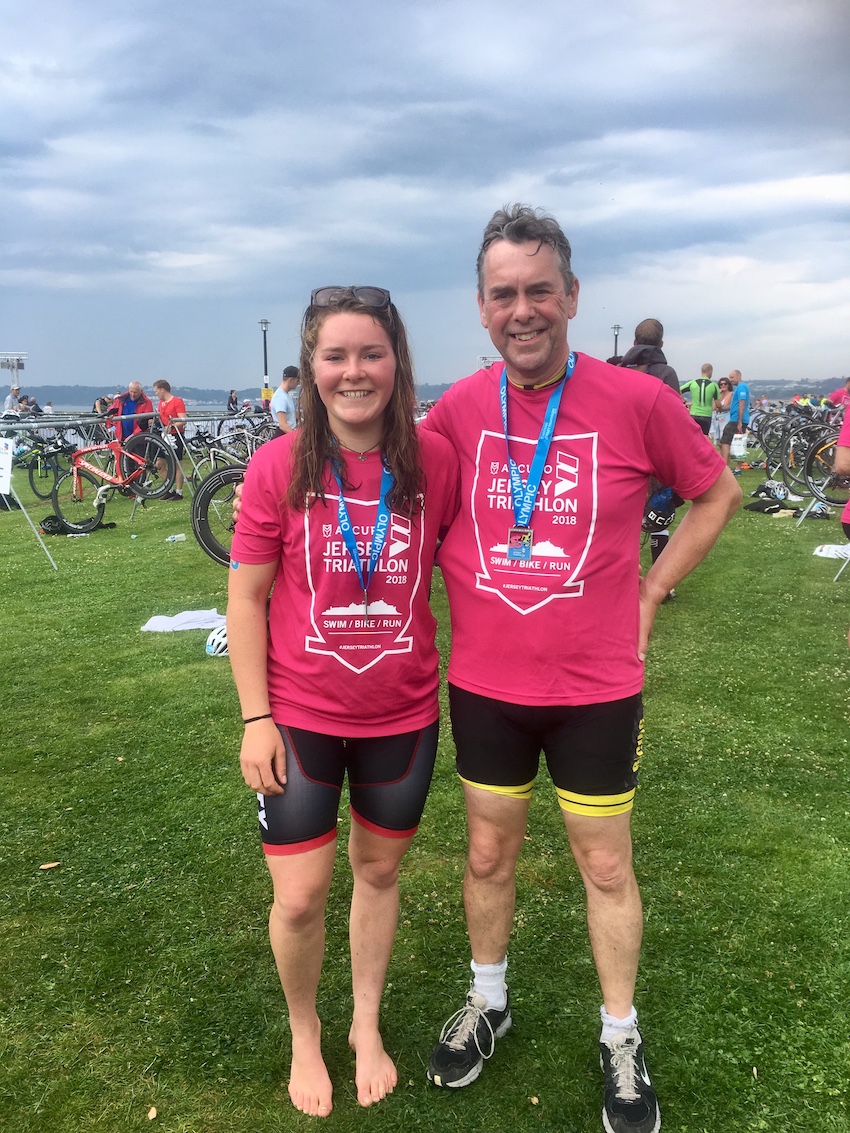

When David Thompson’s wife spotted a new mole on his back, he thought little of it.
He has always enjoyed being outdoors, sea swimming, fishing, generally keeping fit and doing a few triathlons.
He could not even see the mole, but booked an appointment to get it checked.
It was June 2022 and it changed everything.
“That appointment triggered a roller coaster ride that continues to this day, with some frankly terrifying ups and downs,” he said.
“The new mole was removed but the biopsy showed it was a cancerous malignant melanoma. I had cancer.”

Pictured: David Thompson and his daughter at the Jersey Triathlon.
David has told his story to the Cool Down podcast in a bid to raise awareness about the higher risks sports people are at as they are exposing themselves more often to the UV from the sun.
His oncologist was clear that open water swimming is a high risk activity and the probable cause of his cancer.
Guernsey has a globally leading rate of melanoma skin cancers, due in part to exposure to high levels of UV.
“I have always been a ‘skins’ swimmer, strictly speedos, swim hat and goggles only.
“It has been quite straightforward for me though to adapt and make some changes. Now I make sure I always put on factor 50 suncream and wear a long sleeve rash vest when swimming. I also now try and avoid swimming between 10:00 and 16:00, when UV is at its peak. I also check the UV forecast.”
He recommends an app called Skcin.
This gives real time UV levels for specific geographical locations, including Guernsey.
It also shows you forecast UV levels, suggests appropriate precautions, and even texts you reminders to top up your sun cream.
“I now put on factor 50 suncream every morning, whatever the season and whatever the weather. By making it a standard automatic routine I am less likely to forget to put it on. If I am going to be outside I will top up during the course of the day.
“I don’t know what the future holds. None of us do, but I am determined to make the most of every day and keeping fit and active is a big part of that.
“Unfortunately there is a high risk of the cancer recurring. Hence the particular importance for me of avoiding high UV exposure. But by taking a few precautions I can hopefully reduce the risks.”
Getting diagnosed with advanced skin cancer is a major and life changing event.
“In contrast, making a few alterations to your outdoor routine, such as wearing factor 50 and long sleeve rash vests, are minor changes. They will reduce the risks of skin cancer and I wholeheartedly recommend them.
“If ever there was a disease where prevention is better than cure, it is melanoma, particularly because it is often incurable and can be fatal. So, if you are doing outdoor sport in Guernsey, and particularly one that involves sea swimming, it is really important to take precautions.”
The Channel Islands Cancer Report from 2020 contains the latest available data for rates in the island, it runs up to 2016.
Between 2012 and 2016 the yearly average number of newly diagnosed melanoma skin cancers in Guernsey was in the range of 20 to 30 per year.
Taking an average of 25 against a 2014 population of 62,711, that is a rate of 39.8 per 100,000.
Australia and New Zealand are generally considering the countries with the highest rates of melanoma skin cancer in the world.
In 2020 Australia had a rate of 36.6 per 100,000 and New Zealand a rate of 31.6 per 100,000.
Comments
Comments on this story express the views of the commentator only, not Bailiwick Publishing. We are unable to guarantee the accuracy of any of those comments.